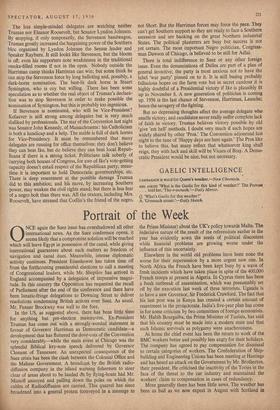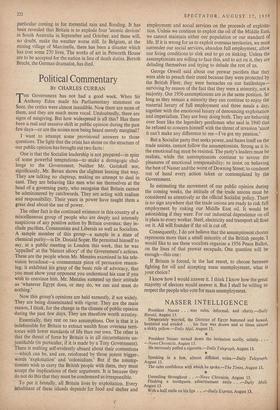Portrait of the Week
0 NCE again the Suez issue has overshadowed all other international news. As the Suez conference opens, it seems likely that a compromise solution will be reached which will leave Egypt in possession of the canal, while giving international guarantees about such matters as freedom of navigation and canal dues. Meanwhile, intense diplomatic activity continues. President Eisenhower has taken time off from the forthcoming presidential elections to call a meeting of Congressional leaders, while Mr. Shepilov has arrived in England accompanied by a delegation of impressive magni- tude. In this country the Opposition has requested the recall of Parliament after the end of the conference and there have been lunatic-fringe delegations to Downing Street to deliver resolutions condemning British actions over Suez. As usual, Mr. Fenner Brockway was well to the fore.
In the US, as suggested above. there has been little time for anything but pre-election manoeuvres. Ex-President Truman has come out with a strongly-worded statement in favour of Governor Harriman as Democratic candidate—a development that has fluttered the dove-cots of the Convention very considerably—while the main event at Chicago was the splendid Biblical key-note speech delivered by Governor Clement of Tennessee. An unexpected consequence of the Suez crisis has been the clash between the Colonial Office and the Maltese Government. A broadcast by the British radio- diffusion company in the island warning fishermen to steer clear of areas about to be landed (in by flying-boats had Mr. Mintoff annoyed and pulling down the poles on which the cables of Radiodiffusion are carried. This quarrel has since broadened into a general protest (conveyed in a message to the Prime Minister) about the UK's policy towards Malta. The indecisive nature of the result of the referendum earlier in the year has evidently sown the seeds of political discontent while financial problems are growing worse under the influence of this uncertainty.
Elsewhere in the world old problems have been none the worse for their supersession by a more urgent new one. In North Africa the French have been kept busy by a wave of fresh incidents which have taken place in spite of the 400,000 French troops at present in Algeria. In Cyprus there has been a fresh outbreak of assassination, which was presumably set off by the execution last week of three terrorists. Uganda is to have a new Governor, Sir Frederick Crawford. The fact that his last post was in Kenya has created a certain amount of resentment in the protectorate. India's five-year plan has come in for some criticism by two committees of foreign economists. Mr. Habib Bourguiba, the Prime Minister of Tunisia, has said that his country must be made into a modern state and that such Islamic survivals as polygamy were anachronisms. particular coming in for torrential rain and flooding. It has been revealed that Britain is to explode four 'atomic devices' in South Australia in September and October, and these will, no doubt, make the weather worse still. In Belgium, at the mining village of Marcinelle, there has been a disaster which has cost some 270 lives. The works of art in Petworth House are to be accepted for the nation in lieu of death duties. Bertolt Brecht, the German dramatist, has died.



































 Previous page
Previous page